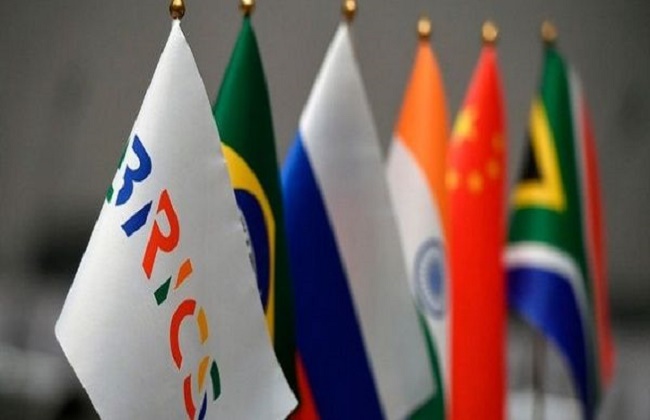
The 15th summit of BRICS countries, which just concluded in South Africa, received unprecedented international attention. Some commentators even invoked the Bandung conference of 1955, where leaders of India, China, Indonesia, Egypt, and Yugoslavia launched the non-aligned movement. It seemed as though another generation of leaders, this time from Brazil, Russia, India, China and South Africa, were building an alternative to the US-dominated global order.
As it happened, their doings and sayings ranged from the semi-farcical to the meaningless. According to a leading South African news website, Indian Prime Minister Narendra Modi refused to leave his aircraft on arrival in South Africa because the host, President Cyril Ramaphosa, wasn’t at the airport to welcome him. China’s Xi Jinping inexplicably failed to deliver a scheduled speech at an opening event where the other leaders spoke, including Russian President Vladimir Putin on video link.
Putin, who didn’t travel due to fear of arrest for war crimes, unsurprisingly blamed the West for his war in Ukraine. Xi’s speech decried acountry, unnamed but recognizable, that is “obsessed with maintaining its hegemony” and obstructing China’s rise. Much agitated talk, notably from President Luiz Inácio Lula da Silva of Brazil, of de-dollarization and an alternative BRICS currency came to nothing.
The summit broke up with BRICS enlarging their membership roster. The group will now include, puzzlingly, crisis-roiled Argentina and Ethiopia as well as oil-rich Saudi Arabia and, until very recently, the latter’s ruthless enemy, Iran. There is still no clarity about what alternative institutions it plans to build. A scheduled news briefing that might have helped clarify this was cancelled on Wednesday in order to give, Ramaphosa claimed, journalists some “rest.”
What then should we make of a group that started life as a casual acronym coined by a British economist at a US securities firm to pitch investments. Rather, how can we avoid exaggerating the importance of BRICS as a counterweight to the decades-old US-led global order?
To be sure, the current rebalancing of the West’s geopolitical and economic power has been overdue for more than a century, ever since Europe plunged into the first of its continental wars. But a generation of Western journalists and commentators are prone to over-interpret this basic historical dynamic.
Two global conflagrations and the destruction of European empires gave the United States its hegemonic position, and Western commentators their basic assumptions about the world. But the West’s strenuous cold war with the Soviet Union, and eventual triumph, distracted them for too long from the much bigger and more consequential event of the 20th century: decolonization.
Once liberated from commodity-extractive and coercive trading relationships with Western nations, Asian, Latin American and African countries were always likely to regain some of their old wealth and power. The dollar was fated to lose some of its global potency — if not as precipitately as the pound sterling did after the two world wars. And large countries with industrious populations such as China, India and Indonesia could no longer be denied certain comparative advantages in the age of globalization.
That said, Pretoria and Johannesburg are no Bandung. Leaders of India, Egypt and China back in the 1950s had freshly emerged from world-historical anti-colonial and national-liberation movements. Whatever you think of Yugoslavia’s Josip Broz Tito, he had led the most successful armed uprising against Hitler in Europe and then stood up to Stalin. Moreover, these men, direct victims and witnesses of racist-imperialist occupations and plundering, sincerely wished to build a global system for equitable economic growth. Actual blueprints, such as the New International Economic Order (NIEO), came out of their efforts.
In contrast, the assortment of princelings, autocrats, demagogues, and war criminals holding forth in South Africa this week have neither the prestige nor the foresight possessed by the delegates at Bandung. In fact, they seem to be learning on the job—how to improvise their way through an increasingly precarious global environment.
Indeed, the “vision” that BRICS countries, including its newest members, have in common, amounts to little more than a cynical expediency: to increase their bargaining power in the trade, technology and military deals that they will continue to vigorously pursue with the United States and Europe.
It can’t be otherwise. Take, for example, India: the country needs cheap manufactured goods from its strategic rival China, cut-price oil from Russia, military hardware and technology transfers from the United States and Europe, and investments from the UAE. Accordingly, it cannot but have a foreign policy carefully hedged against binding commitments to this or that country or bloc in the multipolar world.
Nor can it plausibly claim, while banning rice and sugar exports, to lead the Global South. China’s better credentials in this regard are also fading as it scrambles to contain a mounting economic crisis. Perhaps, we won’t have to wait until the bigger summit of BRICS, hosted by Putin in Russia next year, to notice the gaping void of meaning at the heart of an expanding acronym. [Courtesy: Bloomberg]
Pankaj Mishra is a Bloomberg Opinion columnist. He is author, most recently, of “Run and Hide.”


